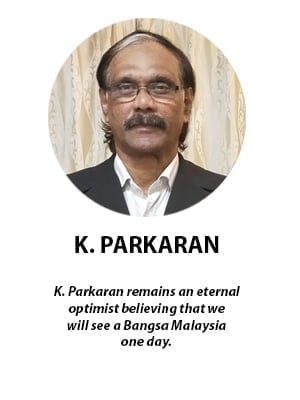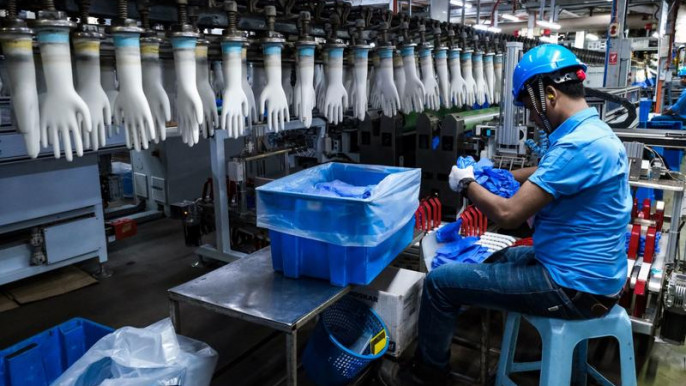Political will needed to revamp intake of foreign workers
Recent reports seem to suggest that foreign workers are being brought into the country with fictitious jobs and exaggerated quotas which land them in much trouble

K. Parkaran – 21 Mar 2023

Some things just don’t seem to change in Malaysia, and the plight of migrant workers is one of those things.
Despite the positive statements by the new government leaders to eradicate exploitation of workers and to stop the undocumented from entering Malaysia, it is happening again, with cases being reported of foreign workers coming here after spending tens of thousands of ringgit and being left in the lurch.
It’s hard to blame the policymakers in this instance, as the request for the number of workers is from businesses, and quota approvals are made by the labour department .
Last week, in a quick reaction, the government suspended all applications and processing for foreign workers until further notice to ensure the employers sort out the arrival of the 995,396 approved workers so far.
Human resources minister V Sivakumar said this after it was found that the number of approved workers coming into the country was low compared to the 995,396 given the nod to date.
This makes one wonder if the urgent requests for foreign workers has been a ploy by some to bring them in first and find employers later. This had happened in the past frequently, causing huge social problems.
The minister’s decision to suspend fresh approvals is the right move but there is a need to check on how these quotas were approved in the first place, and asking the agents and employers to state their reasons for the delays in bringing in the workers despite their urgent requests.
A few days ago, Indonesian ambassador Hermono said of the 65,850 applications approved for maids, only 3,150 employment contracts have been signed. He suspects that many of them could have reached here by illegal means.
On 15 March, 10 Bangladeshi migrant workers, who paid RM20,000 (460,000 Taka) each to a recruitment agency in Dhaka to reach Malaysian shores, were arrested after their employer left them in the cold.
They told immigration authorities that two agents took their passports away after meeting them at Penang airport.
The shocking part is these workers were not in possession of valid documents, after their purported employers failed to provide them with jobs since they arrived last December.
The 10 of them were in the second batch of 47 workers who arrived on Dec 29 and remained in Penang. The first batch of 48 workers who arrived on Dec 21 moved to Selangor.
A check on their documents showed that they entered the country with a “Visit Pass Temporary Employment” category issued by the Malaysian immigration on Nov 28 last year.
This is a temporary three-month permit to enable migrant workers to come in and work immediately while the employers apply for a full work visa. Obviously, all of them were found to be in possession of the pass which expired last month.
Based on this, it appears that all the 95 workers who arrived in December could be facing the same plight, wherever they are staying. And God knows how many more such workers from Bangladesh and Indonesia are here in Malaysia.
As if their mental anguish of unemployment is not enough, the workers said they had to endure living in overcrowded quarters with poor quality food provided by the company which was supposed to employ them.
Earlier this month, 117 workers from Bangladesh were not offered jobs after paying recruitment agents for the approvals under the Foreign Worker Employment Relaxation Plan launched in January.
What’s going on? Just when statements by political leaders gave a glimmer of hope for migrant workers to be treated like human beings, we see them being fleeced by unscrupulous agents from both here and the source countries.
This action is tantamount to human trafficking which has been a bane for Malaysia in the past, pushing it to Tier 3 of the US State Department’s annual human trafficking report since 2020.
In the Penang case, the names of the sending agents in Bangladesh and those receiving them in Malaysia are clearly known. Why is the action against them so slow? Shouldn’t the relevant authorities in the two countries haul them up for an explanation immediately?
Malaysia has in the past been branded as a pariah nation for the way we treated migrant workers, often underpaying them and housing them in dilapidated conditions, or not giving them their wages at all.
It is an open secret that recruitment of migrant workers is a lucrative money spinner, which has seen many immigration officers and politicians being hauled to court for corruption.
Honestly, none of the four governments in the last six years, including the current one, seem to have a clue on how to wipe out this “flesh trade”. The ministers and government heads appear to be fond of dishing out statements after statements, with little or no action.
Our borders may be a little porous, allowing some undocumented migrants to slip in, but obviously there are people who may be enabling this despite recent tough actions against corrupt immigration officers.
There has to be a complete overhaul of the system of recruitment of foreign workers once and for all.
All it needs is some serious political will with honest politicians and civil servants who work for the nation and not money.
The views expressed are those of the writer and do not necessarily reflect those of FMT.
—-
Background to this Opinion Piece
1. 10 Bangladeshis held after ‘employer’ leaves them out in the cold – The workers claim they paid a Bangladeshi agency about RM20,000 each to secure them jobs in Malaysia at https://www.freemalaysiatoday.com/category/nation/2023/03/16/10-bangladeshis-held-after-employer-leaves-them-out-in-the-cold/
2. Approvals for foreign workers suspended until further notice https://www.freemalaysiatoday.com/category/nation/2023/03/18/approvals-for-foreign-workers-suspended-until-further-notice/
Additional Background Articles on Malaysian Migrant Worker Quota Chaos
Original source: https://m.malaysiakini.com/news/657244
Human Resources Minister V Sivakumar has warned employers not to take advantage of the ministry’s leniency on zero checks in its migrant worker quota application approvals.
He said the relaxed conditions for quota approvals were temporary and that all companies would be checked in six months’ time.
“Right now, we are not conducting any checks before approving applications, but don’t take this (leniency) for granted,” Sivakumar (above) said.
In January, the government announced the Relaxation of Employment of Foreign Workers Plan in five critical sectors – plantation, manufacturing, construction, agriculture, and services (restaurants) – which would run from Jan 17 to March 31.
Apart from bypassing the premises checks the labour department would normally conduct before approving migrant labour quotas applications, the ministry was also fast-tracking approvals without checking the company’s premises for appropriate accommodation.
On that note, Sivakumar said that there is 1.5 million migrant labour in Malaysia who need accommodations.
Out of the existing accommodations, only 30 percent are certified by the authorities.
“Just because we are not checking before approving their applications, doesn’t mean they can bring migrant workers without first ensuring they have appropriate accommodation.
“We advise employers to ensure there are adequate approved accommodations for their migrant workers before they arrived in Malaysia,” he told reporters after launching Centralised Labour Quarters in Jalan Melaka, Kuala Lumpur.
The relaxed preconditions include bypassing a requirement for employers to prioritise local workers – by advertising available vacancies on the ministry’s dedicated portal.
Under the plan, employers will be allowed to hire foreign workers from 15 source countries without going through the preconditions of employment and quota eligibility.
Responding to a case where a company in Penang had laid off its 102 local workers for migrant labour, Sivakumar said the labour department was investigating the matter despite the company having reinstated the local workers.
“The Penang company has agreed to reinstate the local workers they retrenched, but if we find they have broken the law, we will cancel their quota,” Sivakumar said, adding that their salaries would be brought up to date.
On Wednesday, Sivakumar issued a stern warning to employers that replacing local workers with migrant labour would make them liable to an RM50,000 fine for each offence and have their quota cancelled.
He also said the action of an employer or company to lay off local workers and replace them with migrant workers is an offence under Section 60M of the Employment Act 1955.
The Malaysian Trades Union Congress had also raised concerns over companies allegedly sidelining local workers over new migrant recruits who would be paid a lower salary, as such reducing overall operating costs.
—
Original published link: https://www.freemalaysiatoday.com/category/opinion/2023/02/13/time-to-address-corruption-in-migrant-worker-management/
Letter to the Editor From Andy Hall
Malaysia’s new government has pledged to reform the country’s ineffective migrant worker management systems. Workers from 15 countries will be brought into Malaysia to meet the demands of labour-starved employers quickly, cheaply and effectively. Regularisation or “recalibration” schemes will ensure millions of irregular workers in the country become officially employed and legal.
The prime minister and the human resources minister have warned of a shake-up to migrant worker management processes, particularly regulating the role of “agents”. Malaysia’s home minister travelled last week to Bangladesh, Indonesia and Nepal to discuss achieving these lofty goals.
The new administration is right to focus on abuses by intermediaries (or agents) as a key cause of the abusive and ineffective migrant worker management in the country. Concerningly, however, nothing has yet been said about addressing ingrained corruption also embedded in these same systems.
Many migrant worker dependent industries in Malaysia use in-country intermediaries because they want to pay a “legal” fee to wash their hands of illegalities. Intermediaries engage with corrupt officials (allegedly linked to politicians) to secure migrant quotas for their clients, often bypassing official rules and regulations concerning accommodation quality and migrant-to-local employee ratios.
These same intermediaries, many not licensed under the Private Employment Agencies Act 1981, also facilitate recruitment of workers into Malaysia, regularisation of irregular workers, and worker’s housing and transport. Their service fees are high while their flight, hotel and even leisure activities are charged to workers and source country intermediaries. Employers are often billed the same costs.
When Prime Minister Anwar Ibrahim implied these intermediaries, or “agents”, were the root cause of the ineffective migrant worker management processes in Malaysia, it’s only part of the reality. These facilitating actors are more often just vehicles for the ingrained corruption embedded for decades in these systems.
Payments of bribes by these intermediaries to corrupt government officials or politicians to facilitate recruitment and regularisation of foreign workers on behalf of employers or workers, need to end if we are to start solving Malaysia’s foreign worker challenges.
Bribes or kickbacks paid to ministry staff and Malaysian intermediaries by source country intermediaries must also stop. Currently, it is the source country’s manpower agencies that pay the highest commission to Malaysia that secure the most orders for recruiting foreign workers.
Allegations have been thrown at numerous Malaysian governments over the years of syndicates and systemic corruption in the way contracts have been awarded to private sector actors to manage overly complicated migrant worker management systems.
Worker and employer data management systems and software, multiple health checks both at source and destination, quota, security and visa approval processes, regularisation management – the list of bloated expenses involved in hiring a foreign worker goes on. The alleged profiteering must stop.
Regularisation processes for irregular workers are beneficial. Human, economic and national security gains arise from making workers legal in-country, given the failure over decades of numerous administrations to keep foreign workers regular, protected and employed.
However, bogus employers and intermediaries, including corrupt government officials and politicians, have extorted irregular workers as part of these regularisation processes for too long. Too many workers have been left irregular, in debt and at high risk of forced labour and modern slavery as a result.
All the bribes, commissions and costs involved in hiring a foreign worker are either paid for by an employer or a worker. That means vulnerable and often poverty-stricken workers coming into Malaysia from some of the poorest communities in the world continue to be burdened by these costs and end up in debt bondage, systemic forced labour, and hence modern slavery.
The new administration should consider the risks to vulnerable workers of securing and regularising foreign labour quickly to satisfy its industry constituents. The faster recruitment and regularisation are done, if corruption is not addressed, will result in greater risks to prospective workers and employers.
If the new administration doesn’t control spiralling costs by effectively revising migrant worker policies, ending corruption and properly regulating intermediaries and employers, the risks to vulnerable workers of forced labour from debt bondage will increase. Indebted slaves who involuntarily work non-stop in Malaysian companies to pay back their debt will become more commonplace.
This likely rise in abuse of vulnerable migrant workers will undermine Malaysia’s commitment to address forced labour and modern slavery. Malaysia’s economic security and potential for more inward sustainable investment could well be impaired as the international community and a global business community, increasingly concerned with due diligence and prevention of forced labour, retreat.
An effective migrant worker management system requires balancing national, economic and human security priorities of a state. Human security is the right of workers and citizens. Protecting migrant workers from abuse can easily exist alongside a strengthening of national security by minimising corruption and a strengthening of economic security by reducing unnecessary costs on employers.
The challenges for Malaysia in effectively reforming migrant worker management currently start not with ridding the system of “agents”, as the prime minister implied, but with tackling corruption. Then one can address the poor company practices before ridding the system of the often unnecessary, abusive intermediaries. The essential actors remaining after this reform then need to be made more professional.
One way to ensure responsible migrant worker recruitment is by ensuring employers cover all or most of the related recruitment costs for their workers. Then make selection processes for recruitment intermediaries that remain essential to be transparent and objective. Through a closely monitored open tender process, intermediaries get business based on the benefit they provide, and their ability.
There are indeed some ethical recruitment practices already existing in Malaysia and worker source countries. These need to be highlighted and scaled up in economically and practically effective ways.
Irregular worker regularisation processes should prioritise the rule of law and worker welfare. Corruption should end, and unnecessary intermediaries between employers and workers removed.
Finally, Malaysia’s migrant worker policy development processes and implementation systems need reform. Migrant worker policy should be developed and implemented holistically by a governance structure led by the prime minister, without one ministry dominating the discussions and outcomes.
Andy Hall is an independent migrant worker rights specialist.
——-
More Background Articles on Current Malaysian Migration Debates
FMT 11th Feb 2023: Sub-agents, commissions, bribes and other woes of migrant workers in Malaysia
FMT 11th Feb 2023: Implement zero recruitment cost policy to end ‘debt bondage’, says ex-MP
Malay Mail 9th Feb 2023: HR minister to stop agencies from monopolising hiring foreign workers
NST 9th Feb 2023: Govt to work out best mechanism to hire foreign workers without using agencies
Vibes 8th Feb 2023: Govt to allow hiring migrant workers without agents: PM Anwar
FMT 8th Feb 2023: Stop using agents to recruit foreign workers, says PM Anwar
Bernama 22nd Jan 2023: FMM welcomes foreign worker hiring initiative to meet urgent needs
FMT 17th Jan 2023: Relaxed rules for hiring migrants only for 5 sectors, says govt
Vibes 10th Jan 2023: ‘Bangladeshi recruitment cartels’ grip must end
FMT 10th Jan 2023: Govt’s migrant recalibration scheme to continue till year-end
FMT 10th Jan 2023: Approval for foreign labour now takes only 3 days, says Saifuddin
Malay Mail 10th Jan 2023: PM Anwar: Putrajaya eases rules on the hiring of foreign workers
Malay Mail 10th Jan 2023: PM Anwar to ‘cleanse’ Malaysia’s foreign manpower hiring system by going digital


